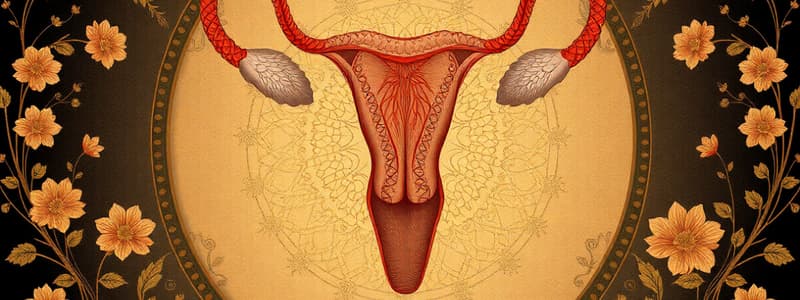Podcast
Questions and Answers
Flashcards are hidden until you start studying
Study Notes
Sexual Self
- Refers to one's feelings, actions, and behaviours concerning various aspects, including:
- Development of secondary sex characteristics
- Human reproductive system
- Erogenous zones of the body
- Biology of sexual behaviour
- Chemistry of lust, love, and attachment
Human Sexual Development
- Begins immediately after fertilization of the egg.
- Rapid reproductive development takes place in the uterus.
- At birth, reproductive systems are not fully developed until puberty.
- All fertilized eggs initially develop as female, with gender differentiation triggered by the SRY gene on the Y chromosome.
- The presence or absence of this gene determines the development of male or female gonads.
Puberty and Secondary Sex Characteristics
- Stage of development where individuals become sexually mature
- Divided into five stages
- Characteristics of each stage vary for girls and boys
- Puberty in Girls
- Ovaries enlarge and hormone production begins (approx. 8-11 years old)
- First external sign of puberty is breast development (approx. 8-14 years old)
- Pubic hair gets coarser and darker (approx. 9-15 years old)
- Whitish discharge from the vagina may occur during this stage
- Menstruation begins (approx. 10-16 years old)
- Puberty in Boys
- No visible signs of development initially, but male hormones become more active (approx. 9-12 years old)
- Height increases, and body shape changes (approx. 9-15 years old)
- Testicles and scrotum grow (approx. 11-16 years old)
- Penis starts to grow (approx. 11-16 years old)
- Pubic hair gets darker and coarser (approx. 11-16 years old)
- Voice deepens (approx. 13-17 years old)
- First ejaculations occur (approx. 12-16 years old)
- Growth spurt (approx. 13-15 years old)
What Philosophers Think About Beauty
- Before the 18th century, beauty was considered objective.
- St. Augustine believed that things were beautiful because they gave delight.
- Plato argued that beauty exists in the realm of forms, and things appear beautiful because they reflect this ideal.
- Aristotle believed beauty is found in order, symmetry, and definiteness.
- In the 18th century, the view of beauty shifted to subjective.
- David Hume argued that beauty exists only in the mind of the beholder, with individual perceptions varying.
- Immanuel Kant believed that judgments of taste are not cognitive but aesthetical, based on subjective experiences.
- Francis Hutcheson proposed an "internal sense of beauty" that operates independently of the external sense of sight or hearing.
Psychological Discoveries About Beauty
- Studies show that perceived attractiveness can influence earnings.
- The halo effect, a cognitive bias, suggests that attractive individuals are often perceived more favorably in terms of personality traits.
- Evolutionary psychology connects facial features to potential mate quality.
- Hormonal influences shape facial features, creating gender-specific characteristics.
Cultural Influence on Body Image
- Cultural traditions can positively or negatively impact body image and self-esteem.
- Body image refers to one's thoughts and feelings about their own body.
Relationship Between Body Image and Self-Esteem
- This aspect is not directly elaborated upon in the text.
Importance of Physical Beauty
- This aspect is not directly elaborated upon in the text.
Studying That Suits You
Use AI to generate personalized quizzes and flashcards to suit your learning preferences.




